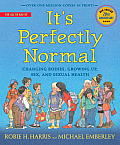Not a Perfectly Normal Route to Publication
Publishers Weekly’s twenty-year retrospective on Robie Harris and Michael Emberley’s It’s Perfectly Normal details how unusual its route to print was.
The book came out of Harris’s conversation with an editor about a book on sexual health for middle-graders, but that editor ultimately chose not to acquire the book.
Harris then did what new authors are specifically told not to do: she partnered with an illustrator, albeit one with a Caldecott-winning family heritage:
In Harris and Emberley‘s case, the press most interested in the project as is was a new and largely unproven company, Candlewick Press. Perhaps that publisher’s European roots—as the American wing of the U.K.’s Walker Books—made it more open to the book’s frank approach.
The book came out of Harris’s conversation with an editor about a book on sexual health for middle-graders, but that editor ultimately chose not to acquire the book.
Harris then did what new authors are specifically told not to do: she partnered with an illustrator, albeit one with a Caldecott-winning family heritage:
With the idea firmly planted, Harris decided she wanted to write a full manuscript before submitting it to any publishers. “It’s complicated and complex, and it’s loaded material for many people,” she explains. It was at this early stage that she called on Michael Emberley, a fellow then-Bostonian who she “knew a little bit. I told him I wanted to talk with him about working on a book about sex and sexual health, and he said, ‘I’ll be right over,’ ” she recalls. When they were able to collaborate on a handful of illustrations that were appealing to kids and also provided information, “I knew we were a team,” says Harris.And that’s another thing not to do, or at least to be aware that such insistence comes at a cost.
The pair submitted their manuscript to several houses with the caveat that the project not be significantly altered.
In Harris and Emberley‘s case, the press most interested in the project as is was a new and largely unproven company, Candlewick Press. Perhaps that publisher’s European roots—as the American wing of the U.K.’s Walker Books—made it more open to the book’s frank approach.



No comments:
Post a Comment